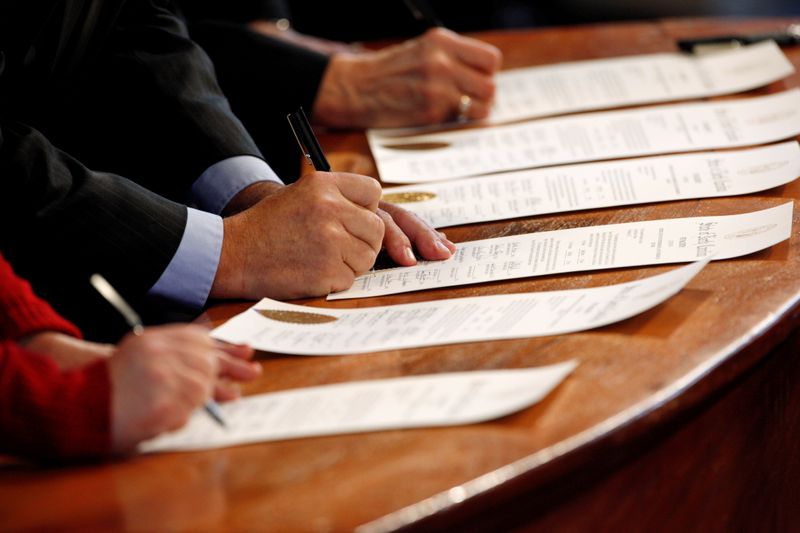By Jan Wolfe
(Reuters) - In the United States, the winner of a presidential election is determined not by a national vote but through a system called the Electoral College, which allots "electoral votes" to all 50 states and the District of Columbia based on their population.
Complicating things further, a web of laws and constitutional provisions kick in to resolve particularly close elections.
Here are some of the rules that could decide the Nov. 3 contest between President Donald Trump and his Democratic challenger Joe Biden.
How does the Electoral College work?
There are 538 electoral votes, meaning 270 are needed to win the election. In 2016, President Donald Trump lost the national popular vote to Hillary Clinton but secured 304 electoral votes to her 227.
Technically, Americans cast votes for electors, not the candidates themselves. Electors are typically party loyalists who pledge to support the candidate who gets the most votes in their state. Each elector represents one vote in the Electoral College.
The Electoral College was a compromise between the nation's founders, who fiercely debated whether the president should be picked by Congress or through a popular vote.
All but two states use a winner-take-all approach: The candidate that wins the most votes in that state gets all of its electoral votes. Maine and Nebraska use a more complex district-based allocation system that could result in their combined nine electoral votes being split between Trump and Biden.
Can electors go rogue?
Yes.
In 2016, seven of the 538 electors cast ballots for someone other than their state’s popular vote winner, an unusually high number.
Thirty-two states and the District of Columbia have laws intended to control rogue electors, or "faithless electors." Some provide a financial penalty for a rogue vote, while others call for the vote to be canceled and the elector replaced.
When do the electors' votes have to be certified by?
Federal law requires that electors meet in their respective states and formally send their vote to Congress on "the first Monday after the second Wednesday in December." This year that date is Dec. 14.
Under U.S. law, Congress will generally consider a state's result to be "conclusive" if it is finalized six days before the electors meet. This date, known as the "safe harbor" deadline, falls on Dec. 8 this year.
Those votes are officially tallied by Congress three weeks later and the president is sworn in on Jan. 20.
What if officials in a particular state can't agree on who won?
Typically, governors certify the results in their respective states and share the information with Congress. But it is possible for "dueling slates of electors," in which the governor and legislature in a closely contested state could submit two different election results.
The risk of this happening is heightened in states where the legislature is controlled by a different party than the governor. Several battleground states, including Michigan, Pennsylvania and Wisconsin, have Democratic governors and Republican-controlled legislatures.
According to legal experts, it is unclear in this scenario whether Congress should accept the governor's electoral slate or not count the state's electoral votes at all.
What if a candidate doesn't get 270 votes?
One flaw of the electoral college system is that it could produce a 269-269 tie. If that occurs, a newly elected House of Representatives would decide the fate of the presidency on Jan. 6, with each state's votes determined by a delegation, as required by the 12th Amendment of the U.S. Constitution.
Currently, Republicans control 26 state delegations, while Democrats control 22. Pennsylvania is tied between Democratic and Republican members. Michigan has seven Democrats, six Republicans and one independent.
The composition of the House will change on Nov. 3, when all 435 House seats are up for grabs.
Will the system ever change?
Critics say the Electoral College thwarts the will of the people. Calls for abolishing the system increased after George W. Bush won the 2000 election despite losing the popular vote, and again in 2016 when Trump pulled off a similar victory.
The Electoral College is mandated in the Constitution, so abolishing it would require a constitutional amendment. Such amendments require two-thirds approval from both the House and Senate and ratification by the states, or a constitutional convention called by two-thirds of state legislatures.
Republicans, who benefited from the Electoral College in the 2000 and 2016 elections, are unlikely to back such an amendment.
Individuals states do have some freedom to change how their electors are chosen, and experts have floated proposals for reforming the system without a constitutional amendment.
Under one proposal, states would form a compact and agree to award all their electoral votes to whichever candidate wins the nationwide popular vote.
